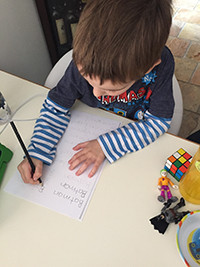
Amy English said it was a bitter-sweet moment when son, Alexander, who has Autism, no longer needed National Disability Insurance Scheme (NDIS) support because he had achieved all his milestones and was now ready for school.
The mum of three, said while her and husband, Luke were ecstatic with their six-year-old’s progress they did shed some happy and sad tears.
“It was bitter sweet,” Amy confessed. “We were so happy Alex had reached all his milestones and we were self-sufficient, and it was a good feeling to think Alex no longer needed the $10,000 he had left in his budget and it would go towards helping somebody else. But at the same time, we felt a bit sad because it was like losing a family member. Alex’s occupational therapist (OT), Helen had been working with him for 18 months and she became so important to us.
“Helen, like us, saw him go from a boy who refused to hold anything, not even a pencil, who wouldn’t comply with anything, start to draw and colour-in properly; use scissors to cut out; write his name; write letters and tie his shoe laces – it was just amazing!”
Amy and Luke said they moved the family from Queensland to the ACT two years ago. “Initially we were on Better Start in Queensland and when we announced we were moving to Nicholls, our Autism advisor said the NDIS was in so they helped us transition straight away,” Amy said.
“It all happened so smoothly. NDIS staff were wonderful and really accommodating. I was able to do everything over the phone. It was such a relief not to go in to an office and have meetings because, at that stage, Alex was very non-compliant.
“Our Better Start Autism advisor also connected us to an excellent OT, paediatrician and psychologist – all have been unbelievable and I can’t thank them enough. Just to have NDIS funding to access these types of supports has been life changing!”
Amy said overall their NDIS experience has been positive. “I self-managed all of Alex’s plan so it enabled me to find service providers, best suited to his needs and access them straight away.
“Alex also saw a speech therapist. Like all of his therapies, we started off with regular sessions then as he progressed we were able to reduce them until his therapists said he no longer needed them.”
The biggest change Amy and Luke noticed in Alex was his ability to listen, learn and cooperate in social settings. “His understanding about change has been huge,” she said.
“Prior, when we would go on holiday to visit family, Alex wouldn’t approach a few male family members. They were big men and I think their size scared him, so when they were around us he would run and hide in a bedroom and then refuse to come out.
“To overcome it, we worked with the OT and the psychologist on social stories. Now Alex goes up to these male family members and gives them a big hug. He’s also going to birthday parties; we can take him in crowds and he’s participating.
“Having these early intervention therapies in place has been so good for us because, prior, we couldn’t go out as a family to functions. I would always have to stay home with Alex and Luke would take the other two children because it was just wasn’t worth it but now we have a different child.
“I know his paediatrician was a bit hesitant about him exiting the scheme because Autism goes in peaks and troughs. Who knows, in six months Alex may need extra care but given he has an Autism diagnosis, it’s great to know we can apply to get back on the scheme if need be.
“In future, I think Alex may need more psychology and we can get a mental health plan for that through our doctor, and thankfully it wouldn’t be a great out-of-pocket expense for us,” Amy said.
Editor's Note
This is a remarkable and unusual story. Alex's reported progress is excellent ... and atypical.
If Alex no longer needs support (as reported above), then he doesn't meet the DSM-5 diagnostic criteria for ASD. A4 is not aware of similar cases documented in the peer reviewed research literature, where autistic children no longer need support - effectively lose their ASD diagnosis - after a few hours of speech therapy and OT per week. Most reports of "optimal outcomes for autistic children" result from an extended period of intensive ASD-specific intervention.
A4 is puzzled:
- that the national Better Start program funded an autistic child since previously the Helping Children with Autism (HCWA) packaged supported autistic children; and
- by the term "Better Start Autism advisor".
With the NDIS roll out, the NDIA shutdown the national HCWA Autism Advisor service that many families said was an excellent and invaluable service.
from https://www.ndis.gov.au/news/news-alex-milestones.html